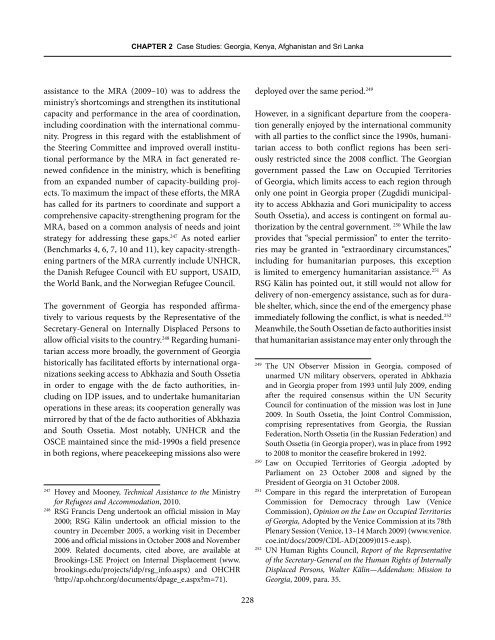From Responsibility to Response: Assessing National - Brookings
From Responsibility to Response: Assessing National - Brookings
From Responsibility to Response: Assessing National - Brookings
Create successful ePaper yourself
Turn your PDF publications into a flip-book with our unique Google optimized e-Paper software.
CHAPTER 2 Case Studies: Georgia, Kenya, Afghanistan and Sri Lanka<br />
assistance <strong>to</strong> the MRA (2009–10) was <strong>to</strong> address the<br />
ministry’s shortcomings and strengthen its institutional<br />
capacity and performance in the area of coordination,<br />
including coordination with the international community.<br />
Progress in this regard with the establishment of<br />
the Steering Committee and improved overall institutional<br />
performance by the MRA in fact generated renewed<br />
confidence in the ministry, which is benefiting<br />
from an expanded number of capacity-building projects.<br />
To maximum the impact of these efforts, the MRA<br />
has called for its partners <strong>to</strong> coordinate and support a<br />
comprehensive capacity-strengthening program for the<br />
MRA, based on a common analysis of needs and joint<br />
strategy for addressing these gaps. 247 As noted earlier<br />
(Benchmarks 4, 6, 7, 10 and 11), key capacity-strengthening<br />
partners of the MRA currently include UNHCR,<br />
the Danish Refugee Council with EU support, USAID,<br />
the World Bank, and the Norwegian Refugee Council.<br />
The government of Georgia has responded affirmatively<br />
<strong>to</strong> various requests by the Representative of the<br />
Secretary-General on Internally Displaced Persons <strong>to</strong><br />
allow official visits <strong>to</strong> the country. 248 Regarding humanitarian<br />
access more broadly, the government of Georgia<br />
his<strong>to</strong>rically has facilitated efforts by international organizations<br />
seeking access <strong>to</strong> Abkhazia and South Ossetia<br />
in order <strong>to</strong> engage with the de fac<strong>to</strong> authorities, including<br />
on IDP issues, and <strong>to</strong> undertake humanitarian<br />
operations in these areas; its cooperation generally was<br />
mirrored by that of the de fac<strong>to</strong> authorities of Abkhazia<br />
and South Ossetia. Most notably, UNHCR and the<br />
OSCE maintained since the mid-1990s a field presence<br />
in both regions, where peacekeeping missions also were<br />
247 Hovey and Mooney, Technical Assistance <strong>to</strong> the Ministry<br />
for Refugees and Accommodation, 2010.<br />
248 RSG Francis Deng under<strong>to</strong>ok an official mission in May<br />
2000; RSG Kälin under<strong>to</strong>ok an official mission <strong>to</strong> the<br />
country in December 2005, a working visit in December<br />
2006 and official missions in Oc<strong>to</strong>ber 2008 and November<br />
2009. Related documents, cited above, are available at<br />
<strong>Brookings</strong>-LSE Project on Internal Displacement (www.<br />
brookings.edu/projects/idp/rsg_info.aspx) and OHCHR<br />
( http://ap.ohchr.org/documents/dpage_e.aspx?m=71).<br />
228<br />
deployed over the same period. 249<br />
However, in a significant departure from the cooperation<br />
generally enjoyed by the international community<br />
with all parties <strong>to</strong> the conflict since the 1990s, humanitarian<br />
access <strong>to</strong> both conflict regions has been seriously<br />
restricted since the 2008 conflict. The Georgian<br />
government passed the Law on Occupied Terri<strong>to</strong>ries<br />
of Georgia, which limits access <strong>to</strong> each region through<br />
only one point in Georgia proper (Zugdidi municipality<br />
<strong>to</strong> access Abkhazia and Gori municipality <strong>to</strong> access<br />
South Ossetia), and access is contingent on formal authorization<br />
by the central government. 250 While the law<br />
provides that “special permission” <strong>to</strong> enter the terri<strong>to</strong>ries<br />
may be granted in “extraordinary circumstances,”<br />
including for humanitarian purposes, this exception<br />
is limited <strong>to</strong> emergency humanitarian assistance. 251 As<br />
RSG Kälin has pointed out, it still would not allow for<br />
delivery of non-emergency assistance, such as for durable<br />
shelter, which, since the end of the emergency phase<br />
immediately following the conflict, is what is needed. 252<br />
Meanwhile, the South Ossetian de fac<strong>to</strong> authorities insist<br />
that humanitarian assistance may enter only through the<br />
249 The UN Observer Mission in Georgia, composed of<br />
unarmed UN military observers, operated in Abkhazia<br />
and in Georgia proper from 1993 until July 2009, ending<br />
after the required consensus within the UN Security<br />
Council for continuation of the mission was lost in June<br />
2009. In South Ossetia, the Joint Control Commission,<br />
comprising representatives from Georgia, the Russian<br />
Federation, North Ossetia (in the Russian Federation) and<br />
South Ossetia (in Georgia proper), was in place from 1992<br />
<strong>to</strong> 2008 <strong>to</strong> moni<strong>to</strong>r the ceasefire brokered in 1992.<br />
250 Law on Occupied Terri<strong>to</strong>ries of Georgia ,adopted by<br />
Parliament on 23 Oc<strong>to</strong>ber 2008 and signed by the<br />
President of Georgia on 31 Oc<strong>to</strong>ber 2008.<br />
251 Compare in this regard the interpretation of European<br />
Commission for Democracy through Law (Venice<br />
Commission), Opinion on the Law on Occupied Terri<strong>to</strong>ries<br />
of Georgia, Adopted by the Venice Commission at its 78th<br />
Plenary Session (Venice, 13–14 March 2009) (www.venice.<br />
coe.int/docs/2009/CDL-AD(2009)015-e.asp).<br />
252 UN Human Rights Council, Report of the Representative<br />
of the Secretary-General on the Human Rights of Internally<br />
Displaced Persons, Walter Kälin—Addendum: Mission <strong>to</strong><br />
Georgia, 2009, para. 35.

















